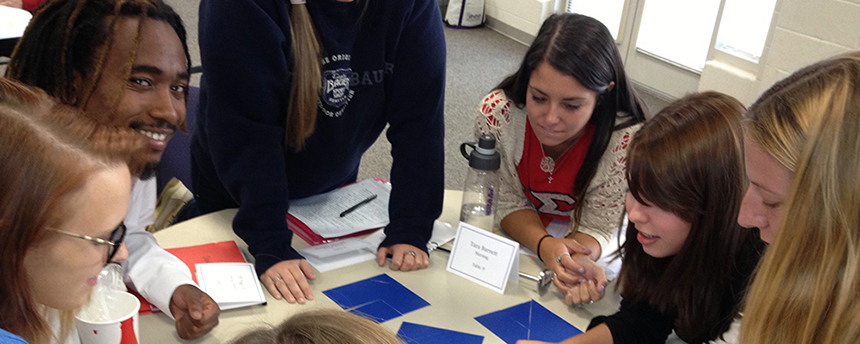
JMU has developed the IPE designation for stand-alone academic courses that have been reviewed by the IPE and IDE Council and approved through the university curriculum process. The courses listed in this section generate between 1 and 3 credit hours and at this time, are all undergraduate courses. The IPE designation allows students to have a clear record of their interprofessional coursework at James Madison University.
Current Courses
This course provides an introduction to skills in professionalism and interprofessional collaboration in addressing local and global health challenges. Students will examine social determinants of health in diverse communities and learn through reflective practice as they interact with health professionals and faculty.
In this course students will examine interprofessional perspectives on complex local and global health issues and apply skills in professionalism, integration, collaboration and reflection to community-based, experiential service learning.
Pairs of students are assigned a CCN family managing caregiving responsibilities, defined as social interaction, for an elder member (age 60+ years) and provide planned contact and support. This course is intended to benefit all participants (family caregivers, their care-receiving members and students) by offering an academic and service-focused experience that validates the common need for human connection, understanding and respect. Paired up in interprofessional teams, students bring their own perspective into the planning of the activities for the weekly visits. Furthermore, following the observation and engagement with a person with dementia, learners identify profession that may be missing in the team but would be helpful to include in the team if that was possible.
This experiential one-credit course utilizes the IPEC (2023) competencies, with a focus on ethical decision-making, as a framework for this experiential course for undergraduate students preparing for careers in healthcare. Students work in interprofessional teams to learn about each other’s body of knowledge and scope of practice through reflecting on their personal/professional values and exploring complex health dilemmas. In addition to working in teams, lectures and readings provide a foundation for understanding collaborative practice, learning about team process and conflict mediation, and building communication and teamwork skills.
This one-credit course introduces an interprofessional trauma-informed approach for students in the health professions. Trauma-informed approaches are relevant to all health professions and throughout the course you will reflect on the roles of diverse professions in promoting health and healing at an individual, family and community level. The course will identify the principles of interprofessional education and collaboration, discuss the definition of trauma, identify the incidence of trauma across populations served by a diverse group of professionals/disciplines, name theoretical perspectives that support a trauma-informed approach, illustrate the biopsychosocial impact of trauma, discuss the intersectionality of trauma with social determinants of health (including race, gender, social economic status, and other factors).

